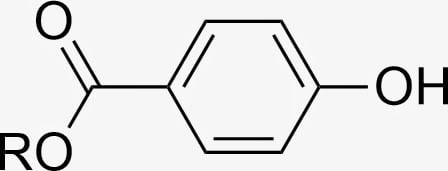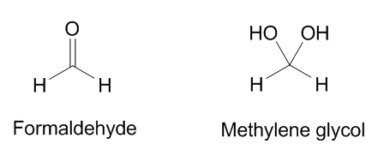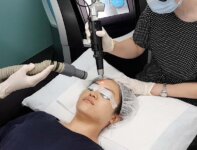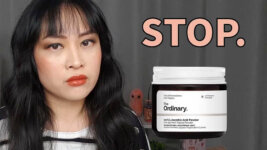Today’s Fact-check Friday focuses on one of the most unfairly demonised of chemicals in beauty products: parabens. You probably own at least one beauty product that proudly declares itself to be paraben-free – is there any reason to buy more, or is it pure marketing?
What are parabens?
Parabens are chemicals derived from a chemical called parahydroxybenzoic acid, with this general structure:
They’re found naturally in many plants like carrots, olives, blueberries, strawberries and grapes. They’re one of the most commonly used preservatives, and are found in many beauty, pharmaceutical and food products. Common parabens include methylparaben, ethylparaben, propylparaben and butylparaben (the “R” part in the structural diagram changes).
Why are they in there?
In both cosmetics and plants, they’re there to fight off bacteria and fungi who would like nothing more than to live it up in lovely damp squishy cream or fruit. Parabens have successfully been used since the 1930s, and are commonly used as they have very low allergy potential, and are very stable.
Why are people making a fuss about them?
Parabens have very weak estrogenic activity. A study in 2004 found that there were parabens in breast cancer tissue – this study received a lot of media attention and is now the subject of many chain emails, although there were many flaws with the study (no comparison was made with healthy tissue, and parabens were detected in blank samples without any tissue in them).
With what’s known about them at the moment – yes, especially in light of the tiny amounts used in typical beauty products. Just like how areas with more ice cream shops have higher rates of skin cancer, the presence of parabens in breast cancer tissue doesn’t mean that they caused it. The many studies attempting to find a causal link between parabens and breast cancer have so far been unsuccessful, and many studies have failed to find even a correlational link. For an excellent series of articles that delves deeper into the studies done on parabens, check out Personal Truth or Scare.
Like every other ingredient though, it’s possible to be allergic. Thankfully, paraben allergy is extremely rare, but can cause eczema-like rashes and even bronchospasm (difficulty breathing).
Why not use an alternative?
Unfortunately most of the alternatives to parabens either have more allergenic or irritating potential (e.g. formaldehyde, ureas) or don’t work very well except in large, irritating amounts (e.g. alcohol, rosemary extract, citric acid), or both.
Verdict: There’s no good reason to avoid parabens. The levels used in cosmetics are safe, and many studies have failed to find a link to cancer.
References
European Commission – Parabens Used in Cosmetics
American Cancer Society – Antiperspirants and Breast Cancer Risk
Personal Care Truth or Scare – Parabens in Perspective







Great article, thanks for taking the time to research this. I try not to buy paraben containing products but never knew why. Now it seems I don’t need to bother. Yay for that because my favourite cleanser and moisturiser contain them 🙂 Cheers
The anti-paraben campaign was pretty strong – a lot of people have vaguely heard of parabens being bad, and a lot of brands have been commercially pressured into formulating paraben-free products. Unfortunately it also means increasing irritation and contamination issues!
Parabens is one that always seems to be in the adverts – I always just assume its all mumbo-jumbo and ignore it all. Its nice to know that I was actually ignoring something that doesn’t really make any difference and that I don’t actually need to worry about!
I also tend to proceed on the assumption that the things being demonised are fine – it works about 80% of the time! 😛
Great post!!
Thanks!
Fantastic post! I try to explain this to clients all the time but I didn’t realize they were also in berries. You don’t by chance know where the cosmetic industry typically sources them from do you? Or are the wholly synthetic (chemically modified) by the time they enter an end user product?
The stuff used in cosmetics is usually synthetic (it’s not commercially viable to extract them from plants), BUT they’re chemically identical to the parabens found in plants. In other words, if you grabbed a methylparaben molecule from a plant and a synthetic one, you wouldn’t be able to work out which was which.
Thanks from the bottom of my evidence-loving heart! Like other ingredients you’ve mentioned lately (camphor, toluene), I would much rather assess parabens based on their actual properties than based on hype and paranoia.
Definitely! Way too much marketing is based on hype and paranoia.
Thanks for this! Please write more about cosmetic ingredients, what their chemical structure is, what they do and if they are irritating in any way.
I shall! 🙂 If you’re interested in some of the older posts I’ve done on various ingredients, check out the active ingredients and chemical tags.
Once again, you do all of us one helluva service! Tons of gratitude from the Sierra Mountains in California, USA.
Our very own beauty myth-buster! Thanks so much for breaking this down into simple terms. I’d definitely heard the paraben-free hype but hadn’t taken the time to look into parabens themselves. You’re a star!
Amy | Bubbles & Blush
Awesome article! I feel so much better knowing this! I guess if a product can tout itself as being “paraben-free” that’s cool, but I’ve never made it a huge deal to avoid them. Seems better to avoid the “definite bacteria now” than “possible cancer later”, hehe.
Thanks! I get that they’re probably not a health hazard, but do you know anything about their effect on early aging of the skin – or if such effect even exists?
I haven’t looked into it very extensively, but this post might answer some of your questions!
This is so cool, thanks! Do you know if parabens in hair products damages your hair though? I’ve noticed my hair looks and feels better after using parabens-free products but I don’t know if it’s just the placebo effect (or my brain trying to justify the price of Kerastase).
They’re used in such pathetically small concentrations that it’s unlikely to have any structural effect on your hair… it could be the other ingredients in the Kerastase products?
Hmm, well all I know is that whenever I use anything with parabens, I tend to break out. This doesn’t happen if I use products without. Whether that is due to my unfortunate luck or perhaps pore-clogging formulation, I can’t say. All I know is, paraben-free for me is the way to go.
It’s possible to be sensitive to parabens, though it’s rare! It does rule out a lot of popular and well-formulated products though, which is annoying – optimistically speaking, it could be another common ingredient. Have you thought about getting a proper skin allergy test done?
Thanks for the awesome article, i freaked out when i realised my moisturiser contains 5 different types of parabens – i’m hoping even though its 5 different types, small amounts are used. Should i be concerned? xx
hey maybe before spreading false information you can educate yourself with these articles
“Our findings suggest that exposure to ethylparaben may increase the risk of gestational diabetes mellitus.”
https://www.ncbi.nlm.nih.gov/pubmed/30844582
“Our results suggest that prenatal exposure to BPs and parabens may be associated with impairment in child cognitive abilities at 2 years”
https://www.ncbi.nlm.nih.gov/pubmed/30831476
“we observed diminished pregnancy success with specific clusters of chemicals among women who underwent IVF cycles in earlier years of study, when urinary concentrations of these endocrine disrupting chemicals were higher.”
https://www.ncbi.nlm.nih.gov/pubmed/30826614
“Our findings support the importance of exposure to antiandrogenic phthalates during adolescence as a potential correlate of maladaptive behaviors including Externalizing Behavior, DSD behaviors, and decrements in Adaptive Skills.”
https://www.ncbi.nlm.nih.gov/pubmed/30818232
research linking to immunodeficiencies (allergy, asthma, diabetes, and lupus): https://www.sciencedirect.com/…/pii/S0160412018319615…
“Our systematic exposome approach identified several environmental exposures, mainly chemicals, that might be associated with lung function. Reducing exposure to these ubiquitous chemicals could help to prevent the development of chronic respiratory disease.”
https://www.ncbi.nlm.nih.gov/pubmed/30737192
Hey maybe before wilding out you
(a) check the publication date of this article against the publication dates of your sources – weirdly enough I can’t see into the future and
(b) actually read the full text of the studies you cite instead of cherrypicking the abstracts, so you can properly understand the researchers’ conclusions…
Refs 1, 2, 6: The studies list a ton of possible confounding factors, hence the use of the words “suggest” and “may”, and they specifically say their results should be viewed cautiously
Ref 3: You conveniently forgot to include the first half of the sentence: “While we found no overall significant associations”. Also warns that results need to be viewed cautiously.
Ref 4: Parabens aren’t phthalates.
Ref 5: Broken link.
Hi, Michelle. Just wanted to ask if do you happen to know a high-quality double-blind randomized controlled study proving that paraben does not cause cancer? Thanks.
It’s impossible to do a double-blind randomised controlled study to prove that something doesn’t cause cancer – an ethics committee would never allow it, and it’s very difficult to prove something DOESN’T cause cancer…
I miss parabens in my sunscreens, as the preservative. Never encountered irritation.
This ‘clean beauty’ movement, and the fearmongering surrounding parabens based on a flawed study, daresay could by responsible for many folks’ dermatologist appointments involving adverse reactions to the replacement & so-called ‘clean’ preservative ingredients.